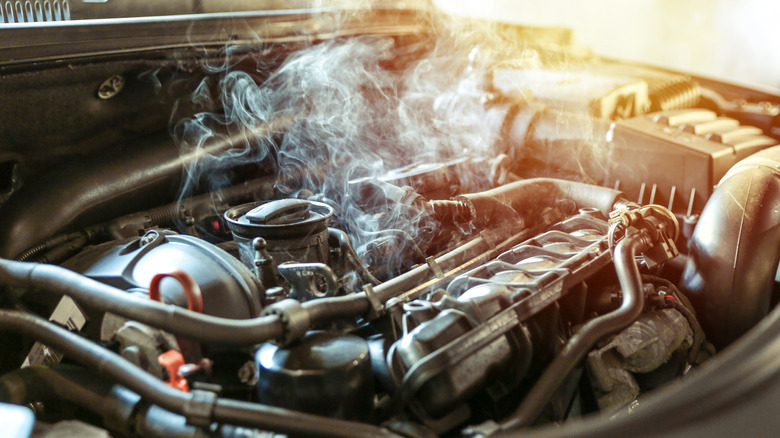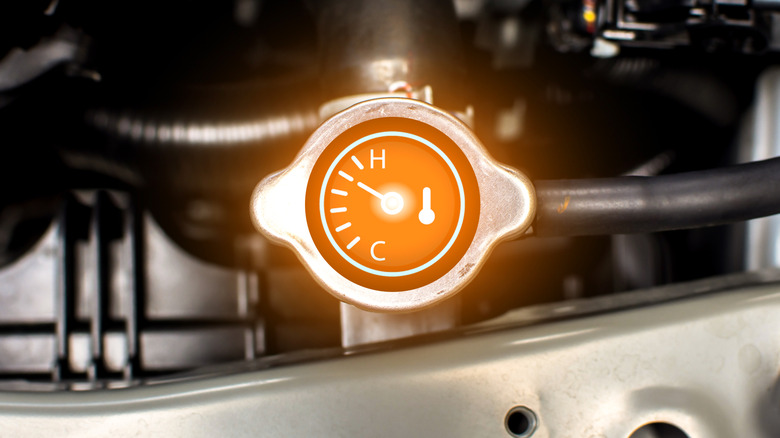What Causes High EGT (Exhaust Gas Temperature) On A Diesel Truck?
Exhaust gas temperature (EGT) is the temperature generated by gases exiting the engine's exhaust. It's an important parameter that helps assess fuel combustion, performance, and efficiency. Diesel engines, typically known to be more fuel efficient, generally produce less EGTs than gasoline-powered cars. However, Diesel trucks that frequently operate under heavy loads often face higher EGTs, as noted by Research Gate.
For diesel trucks, the typical EGT averages around 788 degrees Fahrenheit for optimal performance. Exceeding this range can lead to issues like engine overheating and reducing fuel economy. Excessively high EGTs can raise emissions, and even damage internal components like the turbochargers, piston crowns, and exhaust manifolds in the process, leading to costly fixes. Monitoring these temperature levels is particularly important in turbocharged diesel engines since turbochargers rely on exhausted gases to generate power.
Keeping the EGT levels in check can help you maintain the engine's performance, reduce vehicle operation costs, and prevent costly repairs.
Common causes of high EGTs in diesel trucks
Several factors can cause high exhaust gas temperatures in diesel trucks. Fuel-related issues, such as poor-quality diesel, faulty fuel valves, and damaged injectors, can cause the engine to burn fuel inefficiently. Higher EGTs are also the result of a rich air-fuel mixture, or put simply, if there's too much fuel for the available air. A clear sign of fuel-related EGT problems is black smoke coming from the exhaust.
Restricted airflow, such as a clogged turbocharger or blocked exhaust manifold, can choke the engine, hindering combustion. Insufficient air supply — whether caused by a faulty turbo or air intake — can raise the EGT levels. A diesel engine that isn't timed correctly doesn't operate as smoothly or produce as much power as it should, which may decrease fuel efficiency while increasing its EGT.
Mechanical causes, such as a compromised cooling system, can force the engine to work harder and less efficiently, further increasing EGTs. Also, a leaking head gasket may cause exhaust temperatures to rise by allowing combustion gases to pour into the cooling system. To carry heavy loads or haul large trailers, diesel trucks require more power, which already raises the temperature. So, operating a truck under heavy (and sometimes capacity-exceeding) loads puts a strain on the engine, pushing EGTs beyond the safe 1,500-degree Fahrenheit point.
How to fix and prevent high EGT in a diesel engine
Since high EGTs can stem from various factors, fixing these issues begins with accurately identifying the root cause. One of the most common fixes involves cleaning or even replacing the blocked components — like the turbocharger, catalytic converters, or manifold — to restore proper flow. Similarly, replacing or cleaning fuel injectors can correct the bad air-fuel mixture. While you're at it, make sure the turbocharger is receiving enough air to operate normally.
To prevent high EGTs, drivers should keep their diesel truck engines well-maintained, including regular fluid checks, oil changes, and tune-ups. Make sure to know when your vehicle needs new timing belts. Also, avoid prolonged high-speed driving, as this can put a lot of stress on the engine. Since the truck's load also increases engine gas temperature, keep tabs on your truck's loading capacity for better performance. Fortunately, a lot of modern trucks come with pyrometers (EGT gauges), which give drivers real-time temperature information, so that can help keep track as you drive.


